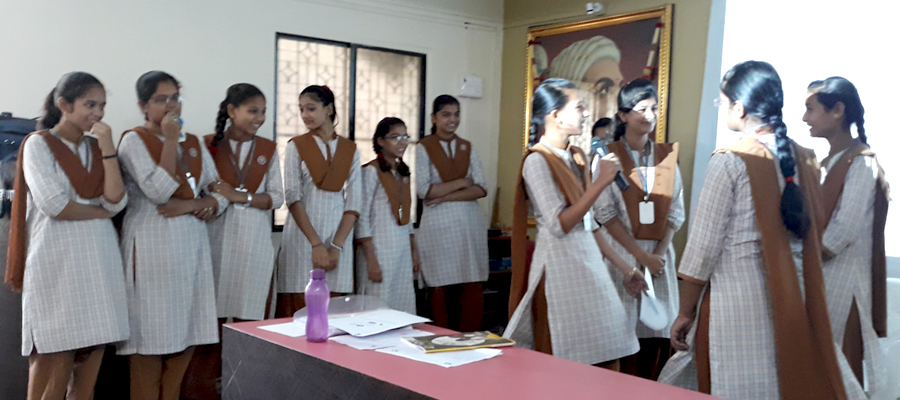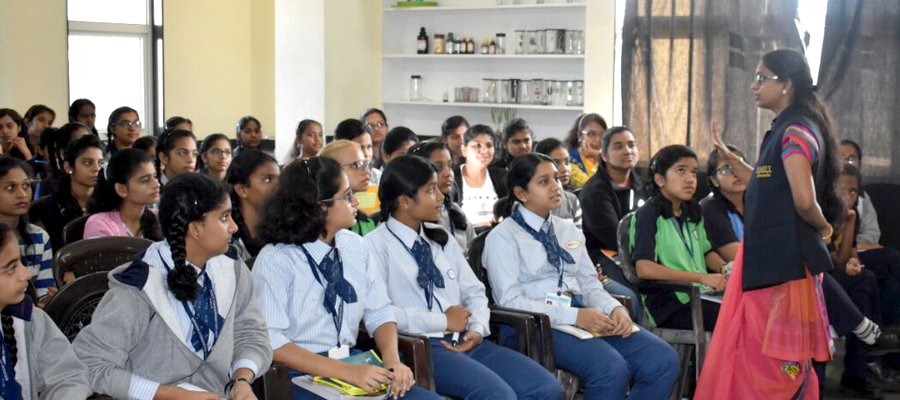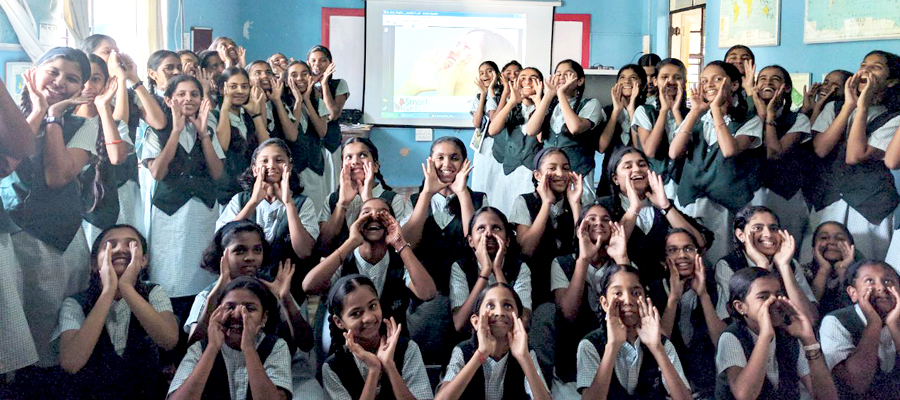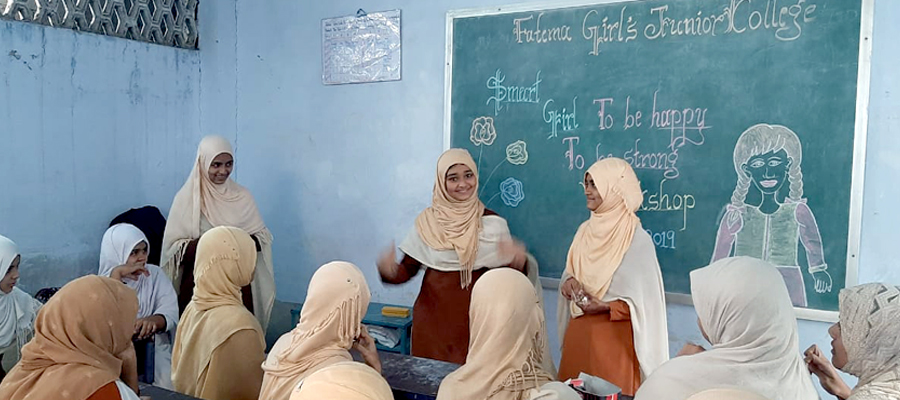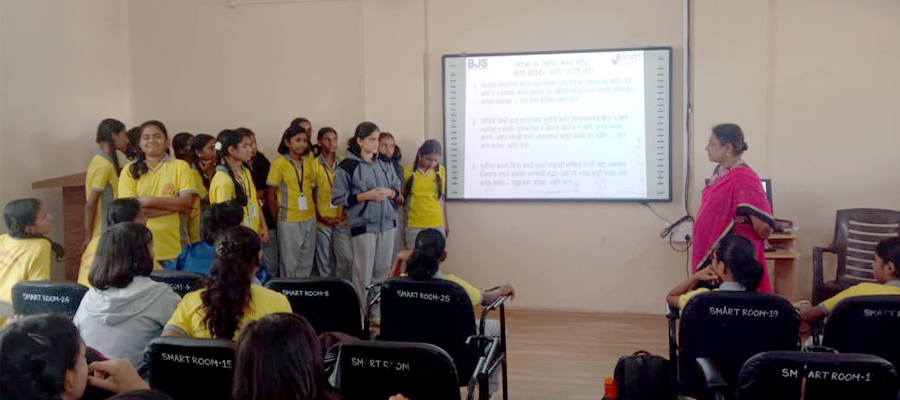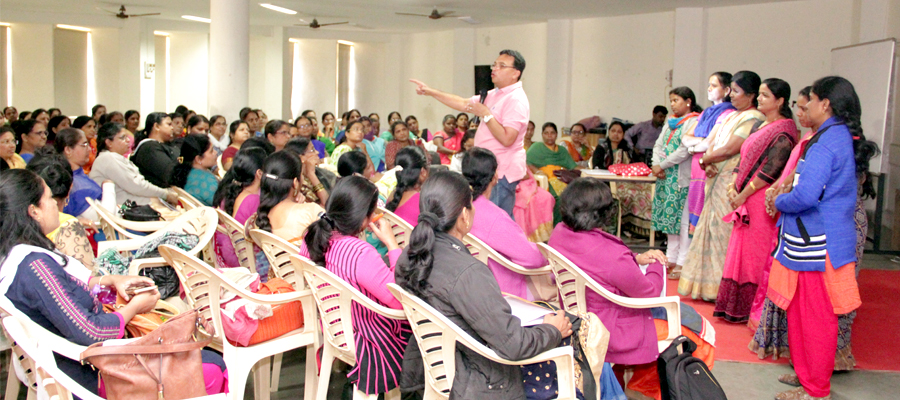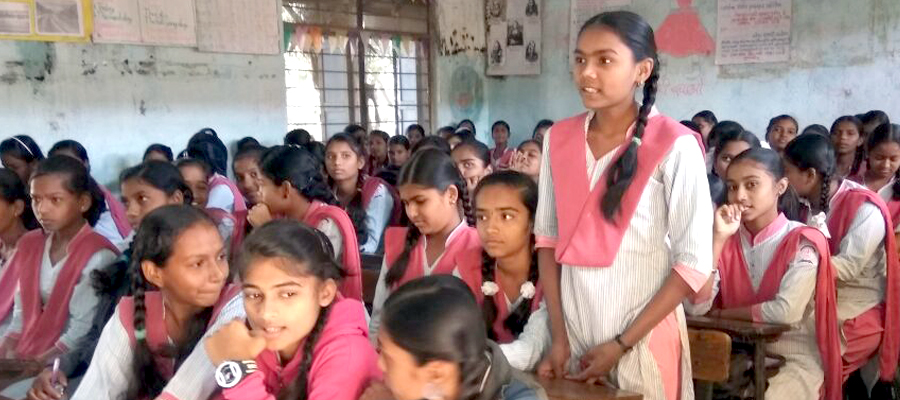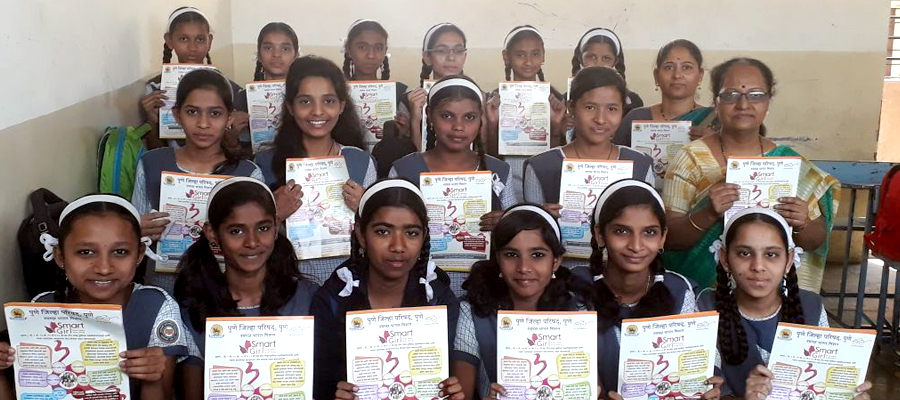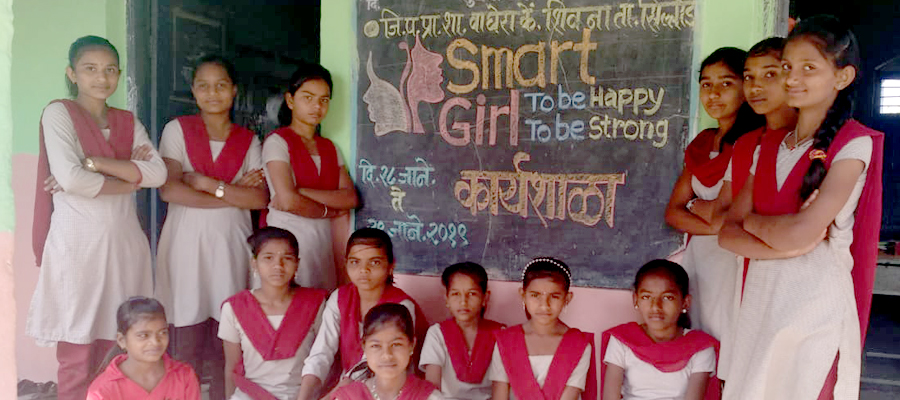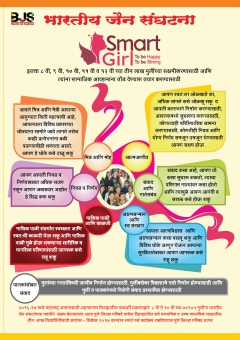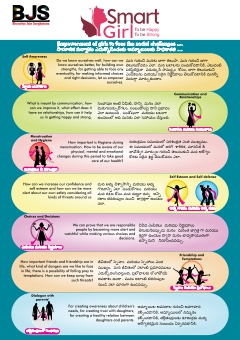
-
Smart Girl - Zilla Parishad Program
(Implementation in Government Schools)
- Back
BJS’ Smart Girl Program (Empowerment of Girls)
BJS’ Smart Girl program, formerly known as EOG (Empowerment of Girl) is a unique endeavour that seeks to address issues and concerns related to the emotional development of adolescent girls in the age group of 13-21 years. Since 2008, more than 6 lakh girls studying in government schools/colleges have been empowered through the Smart Girl program.
The underlying assumption to this program is that girls between the age of 14-18 years are emotionally vulnerable and denied equal opportunities for development as compared to boys in a similar age group. Addressing this gender gap will lead to overall development in girls thereby increasing their capacities to make decisions and control over their own lives. The prevailing social environment and increasing reports of violence (physical and verbal) against girls also necessitates the implementation of the Smart Girls program.
The central focus of the Smart Girl program is the mental, emotional and social empowerment of adolescents girls and young women with skills, attitudes and abilities that support them in making the right choices and decisions to live a dignified life. It aims to help them to become more resilient in the face of crisis and in the rebuilding of their societies.
As of July 2021, with the help of 546 master trainers and 7,048 trainers, 10,825 workshops have been conducted to empower 6,15,448 adolescent girls and young women in government schools/colleges.
Smart Girl Program Objectives
1.To significantly enhance self-awareness in girls that directly and indirectly improve their social status
2.To significantly enhance self-awareness in girls that directly and indirectly improve their social status
3.To increase knowledge about maintaining self-esteem in girls and young women
4.To instil confidence to face adversities and to know the practical tips for self-defence
5.To generate ability in girls for balancing choices and making life decisions rationally
6.To facilitate positive beliefs in girls about right friendship and handling temptations
7.To sensitize parents for their adolescent children’s developmental and emotional needs
8.To enhance systems and institutional capabilities for sustained improvement in the development of girls
Smart Girl Program Reach in Government Schools
Maharashtra Zilla Parishad Schools
The Government of Maharashtra implemented a large scale district level pilot project In Ahmednagar district in 2016-17. In this project, 74,643 girls were benefitted through 1122 workshops conducted by 986 Smart Girl trained government teachers, who were trained by 72 master trainers. The program is now run by the government teachers in their respective schools for the new girls coming in 8-9-10 standards. It has received positive feedback from parents, school principals, teachers, girls and district government authorities.
Five districts of Maharashtra run this program through their own teachers and master trainers who have been trained by BJS’ master trainers. The program designed and developed by BJS is provided free of cost.
| District | Year of starting | No of Master Trainers | No of Teachers | No of workshops | No of Girls |
|---|---|---|---|---|---|
| Ahmednagar | 2016-17 | 72 | 986 | 1122 | 74643 |
| Pune | 2017-18 | 157 | 2706 | 3701 | 205765 |
| Wardha | 2018-19 | 0 | 443 | 517 | 26359 |
| Nanded | 2018-19 | 53 | 653 | 1022 | 67114 |
| Aurangabad | 2018-19 | 103 | 1375 | 1781 | 99317 |
| Total | 385 | 6163 | 8143 | 473198 |
Madhya Pradesh & Andhra Pradesh
| District | Year of starting | No of Master Trainers | No of Teachers | No of workshops | No of Girls |
|---|---|---|---|---|---|
| Madhya Pradesh | 2016-17 | 81 | 454 | 311 | 14256 |
| Andhra Pradesh | 2017-18 | 0 | 118 | 713 | 28891 |
| Total | 81 | 562 | 1024 | 43147 |
Why there is a need for the Smart Girl program?
Adolescence is a vulnerable period in an individual’s life. It is essential to understand the factors that influence the adolescent social, psychological and physiological development for planning effective social service delivery systems to help adolescents survive the many risks that threaten their wellbeing.
Of the 1.2 billion adolescents aged 10 to 19 years worldwide, 243 Million (about 20%) live in India. Out of which, nearly 113 million are adolescent girls. Yet, in India, there are limited social service delivery systems for adolescent social, psychological and physiological development.
In today’s context, girls have better life prospects than previous generations in many ways. Prosperity and nutrition are improving, child marriage and teenage pregnancy is decreasing and female educational attainment and participation in the workforce are on the rise. However, these advancements are far from universal and poor girls are often left behind and their rights undermined.
In addition to the social forces against them, girls continue to face high levels of gender-based violence, unwanted pregnancies and unsafe deliveries. One in four girls is getting married before attaining 18 years of age and one in five adolescent girls aged 15-19 years is giving birth. Despite these challenges, many girls manage to play a critical role in their homes and communities, even in crises. They are often the first responders who care for their families and establish networks that produce the social capital and resilient communities to survive.
Protecting and promoting their rights, health and wellbeing is, therefore, an essential element of crisis preparedness, effective response and recovery. Empowerment is a process of ongoing change through which girls expand their aspirations, strengthen their voice and exercise choice.
Knowledge and skills are fundamental to girls ability to make informed choices and effectively exercise their rights in the empowerment process. A large body of evidence shows a correlation between girls education and a range of health and development outcomes, including delays in marriage, reduced risk of HIV infection and increased employment and economic growth. In addition to formal education, skill education, counselling and mentorship can be important avenues for the girls to gain knowledge and skills that enable girl empowerment.
Smart Girl Program Key Benefits
Smart Girl Program Content Modules
The program has six educational modules aimed towards empowerment of girls:
1. Self-Awareness: This module focuses on exercises that make the girls realise their strengths and weaknesses. It then helps them improve the strengths and control or reduce the weaknesses. This also guides them on how to bring about a positive change in their personality by self-questioning the social, physical and emotional aspects and critical observation of their roles, experiences and events in their daily life.
2. Communication and Relationships: This module guides the girls on good communication skills and maintaining healthy relationships. Through activities, the girls get to understand the causes of differences in opinion and their value in arriving at well-balanced decisions.
3. Menstruation and Hygiene: It focuses on physical aspects of their body, menstruation, hygiene, and nutrition. Topics, which all parents would like their children to know, but are not comfortable discussing at home are covered in detail and with scientific explanation. Healthy practices regarding menstruation are shared. This is being supplemented with health and nutrition knowledge.
5. Choices and Decisions: This module develops their ability to make the right choices among the various options. The girls develop an understanding that with the freedom to make a choice comes great responsibility and equips them to conduct themselves responsibly. Elements like time management, career planning, social media and technology and their impact on our lives is a part of this session.
6. Friendships and Temptations: This informs them of the importance of friends in one’s life and how to choose friends particularly close friends. There is no need to hide good friendships from parents. It educates the girls on the temptations arising from friendship with boys, risks involved in internet surfing, Facebook uploads and social media interaction and alerts them on the best practices. Important aspects like differences between a good touch and bad touch, etc. are also covered.
Smart Girl Program Delivery Model for Govt. Schools
Program Impact Assessment Outcomes
During the program design and development stage, a pilot run of the program was conducted. The program was evaluated on an iterative basis, using scientific and statistical tools at baseline and end-line stages to assess the delivery of the content and achieving the desired outcomes.
The girls’ empowerment program was approved after these parameters were achieved satisfactorily. BJS carried out a detailed impact assessment of the Smart Girl Program when it was rolled out in the Government schools. This was done by conducting a baseline assessment by recording feedback from the girls and then conducting the end line assessment in the same manner. The results were very encouraging.
This positive impact is also complemented by feedback from principals, teachers and parents. BJS, an NGO working for women empowerment, received numerous letters, videos from them stating that the program makes a great positive impact on young minds. Some of these videos are shared in the video section on this page.
A notable change observed in the girls was that they started trusting their parents and teachers and shared their difficulties in complete confidence. This led to many complex issues surfacing up quickly and getting resolved, saving the embarrassment of the adolescent girls. Many parents and teachers have reported improvement in communication and relationship with the girls.
As a tangible outcome, there were many threats and risks which were averted, in complete secrecy, resulting in the confidence of the girls in the family structure and societal support. The success of the program was so high that the school administration and CEO from the five districts of Maharashtra on their own asked for refresher training of the master trainers and teachers in the year 2019-20 (school session).
